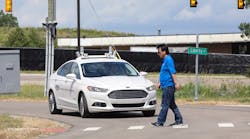Valens Semiconductor, which has introduced networking chips that simplify vehicle connectivity by untangling the cabling inside them, said on Tuesday that it raised $63 million of venture funding from Linse Capital and Oppenheimer Asset Management to ramp up chip development for the autonomous car space. Potential customers are those trying to recreate the car’s electronic architecture.
Inside vehicles today are more than a hundred electronic control units powering everything from windshield wipers to automatic braking. But the automotive industry is trying to change how all these parts are connected so that cars can handle the bandwidth and speeds necessary for infotainment, telematics and advanced driver assistance systems in addition to existing functions.
Valens could enable the use of computer systems that that take over the functions of multiple control units simultaneously, sharing the same radar and other sensors, and talking to each other without delays. That will fundamentally change how cars are wired. The company’s chips encode data before sending it around the car over a single unshielded twisted pair, serving to reduce the girth and number of cables in the vehicle.
“The autonomous and connected vehicles that automakers are designing today depend on advanced chipsets to enable high-speed data transmission,” said Dror Jerushalmi, chief executive and founder of Valens, in a statement. “Our focus is mainly on product development—new features, new chipsets, and addressing the needs of our customers,” he told Electronic Design. The company has higher speed chips in development, he said.
To handle the deluge of data discharged by cameras, radar and other sensors in autonomous cars, networking chips have to support high bandwidth without introducing long delays or electronic interference, he added. Other requirements include redundancy, resiliency and support for different network architectures. Valens attempts to address that challenge with chips that extend native PCIe interfaces to 50 feet within the vehicle.
Valens builds chips that support the HDBaseT standard, which is capable of sending uncompressed audio and video, control, USB, Ethernet and around 100 watts of power simultaneously over an unshielded twisted pair copper cable, reducing the weight and cost of the vehicle’s wiring harness. Valens, which has also raised money from Delphi Technologies and Samsung, says that its chips would be installed in production cars by 2020.
The company is facing increasing competition from major players in data center networking. Broadcom and Marvell Semiconductor are also building Ethernet chips that – like HDBaseT – work with a single unshielded copper cable. Other rivals include Aquantia, which sells the networking chips used in Nvidia’s autonomous driving systems, and NXP Semiconductors, which plans to expand its range of automotive Ethernet chips.
“As the car becomes a data center on wheels, it is paramount to provide the necessary infrastructure,” said Jerushalmi.

